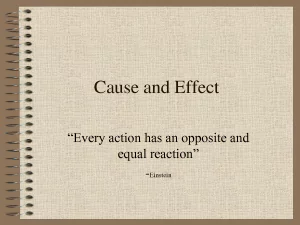
When you write a cause and effect essay, you need to explain how specific conditions or events translate into certain effects. In other words, your task is to show how one thing leads to another. In most cases, you will need to demonstrate how multiple causes result into one effect, or how only one condition becomes the cause of several consequences.

✅ AI Essay Writer ✅ AI Detector ✅ Plagchecker ✅ Paraphraser
✅ Summarizer ✅ Citation Generator
Steps for Writing a Cause and Effect Essay
- Choose an event or a phenomenon to analyze. Ask yourself, “What happened,” and then try to answer the question, “Why did it happen?”
- Sketch out the main points of your essay in the introduction. Let readers understand what your paper is going to be about in general .
- List the causes and give their description, so your reader can grasp the whole situation.
- Follow up with the effects, showing the connection between reasons and consequences. Your reader must understand how you have arrived at one from another.
- Explain why your analysis is important and what its practical meaning is.
- Make a conclusion.
Cause and Effect Essay Topics
Since almost any event has both its causes and consequences, there are a vast variety of possible topics for a cause and effect essay. Still, it would be reasonable to choose a topic you are familiar with. These may be:
- Video games can boost IQ.
- Optimism improves immunity.
- Using social media improves communication skills.
- The promotion of bicycle use helps reduce traffic jams.
- Cellphone use can improve family relations.
- Social media can help teens with their socialization.
- Living together before getting married makes marriage better.
- A happy marriage makes a person’s life longer.
- Going to college helps people make better choices and have happier marriages.
- Developed communication skills help families have close relationships.
- Immigration and the growth of xenophobic prejudices.
- Negative effects of smoking.
- Factors that lead to depression.
- A correlation between economic crisis and unemployment.
- Economic consequences of the war in the Middle East.
- Effects of global warming.
Key Points to Consider
- Mind that the same event may be a cause and an effect simultaneously. For example, the collapse of the Soviet Union may be studied as a result of many domestic and foreign factors, but at the same time, it can be considered a cause of the restructuring of the Eurasian geopolitical space, the uprising of China and so on. Decide in which direction you are going to move.
- Concentrate on those effects that relate to the causes directly, and are close in time to them. This will prevent you from having to go into unneeded analysis of far-reaching consequences.
- You might find it useful to sort effects by categories, so that you do not confuse anything. For instance, if you describe the consequences of the Second World War, you can divide them into social, economic, and political sections.
- State clearly what exactly you are going to examine: causes, effects, or both.
Do and Don’t
Do
|
Don’t
|
Common Mistakes When Writing a Cause and Effect Essay
– Forgetting to show connections between causes and effects.
– Covering a broad topic and digging into a large number of causes, consequences, and arguments.
– Losing links in a causal chain. If you have a sequence of causes that flow logically one from another, then missing one or several of them will make your paper harder to understand.
– Forgetting to use supporting details.
– Forgetting the purpose of your paper. For instance, starting to write a persuasive paper may end up with an informative one.
Now that you have acquainted yourself with the basic cause and effect essay writing tips and rules, you can check out our cause and effect essay samples to link theory with practice.
Follow us on Reddit for more insights and updates.




Comments (0)
Welcome to A*Help comments!
We’re all about debate and discussion at A*Help.
We value the diverse opinions of users, so you may find points of view that you don’t agree with. And that’s cool. However, there are certain things we’re not OK with: attempts to manipulate our data in any way, for example, or the posting of discriminative, offensive, hateful, or disparaging material.
Comments are closed.